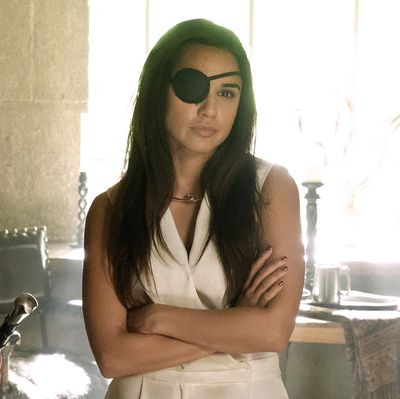
Every TV show has a rhythm. The Americans was a logarithmic acceleration; Brooklyn Nine-Nine is a burst of fizzy bubbles; the rhythm of any cop procedural is a reliable clockwork ticking. When Syfy’s The Magicians premiered three years ago, it felt uneasy, caught too tightly inside the Lev Grossman novels that inspired it. Now in its fourth season, which premieres Wednesday night, The Magicians is like watching a silver ball rocket around a pinball machine, if that pinball machine were somehow operating outside the logics of Newtonian physics. For short stretches you’ll feel confident about its trajectory and momentum, until it suddenly ricochets into unseen wormholes and reappears in unexpected places, happily zipping around as if nothing happened at all.
The Magicians moves almost too quickly to follow. Its universe makes no sense, and even for someone who’s read Grossman’s books, it’s essentially impossible to track as a linear plot. It is a hurtling comet powered by fantasy logic, horniness, trauma, revenge, painful self-awareness, and begrudging but unshakable friendship. When I first watched it in 2016, I quit after four episodes. When I came back to it this time, skimming the rest of season one and then settling in with the rest, I gulped two seasons in less than a week, and at one point in season three found myself so overcome that I swaddled my entire head in my cardigan and shook with joy. I watched the first three episodes of season four provided to critics much too quickly, and I cannot wait for the rest.
The premise is roughly the same as Grossman’s original trilogy: A group of magicians attending an American grad-school equivalent of Hogwarts (here called Brakebills) gets caught up in a fantasy world that’s much weirder and more metafictional than expected. By the end of the first season, they’ve discovered that their universe’s version of the Narnia books are about a real place called Fillory, somewhere they can actually travel to. No longer just disaffected, hard-partying grad students, Eliot (Hale Appleman) and Margo (Summer Bishil) become the High King and Queen of Fillory, Alice (Olivia Taylor Dudley) takes a swerve through magical energy-demon status, Penny (Arjun Gupta) is an astrally-projecting librarian, and Julia (Stella Maeve) spends quite a while trying to kill a god.
Then there’s Quentin (Jason Ralph). He’s the protagonist of Grossman’s novels, a “what if Harry Potter were a drunk, depressed 19-year-old” thought experiment that keeps him roped into the role of the books’ primary perspective. In Sera Gamble and John McNamara’s TV series, Quentin becomes less central, just one of many compelling stories. He’s still a little bumbling, but he’s more sweet and affectionate, and less strangled by his own presumed self-importance. It’s just one of many major changes between the book and TV series, but it’s telling: In the books, Grossman makes Quentin the protagonist so he can ultimately upend his sense of entitlement, but that still means the arc of the novels is defined by Quentin’s experience. The TV series jettisons that baggage almost immediately. Quentin’s prominence is quickly overshadowed by Eliot, a proudly horny lush who’s like a pansexual Bertie Wooster without any accompanying Jeeves, and whose gradual tilt toward sincerity is that much more heart-rending as a result. The series also makes several fast adjustments to the women characters, all of whom are more prominent much earlier in the story, and who quickly stomp out any hint that they might be pigeonholed into limp love interests.
All of those changes are good. They’re crucial, really — what should be a bare-minimum requirement for how to make Grossman’s trilogy work as a TV show. But they’re not the most important change, which has less to do with the relative significance of each character in the story, and is more about the fundamental way The Magicians tackles the experience of living in the world. The show is a romp, but it’s also a show about human beings trying to live in a universe where the rules are perpetually shifting around them, where every day brings some new nonsensical obstacle, and where all of their efforts are undermined by nightmare-logic monsters that would be hilarious if they weren’t also truly scary.
By season four, the world around The Magicians’ merry gang of high-functioning magical substance abusers is crumbling at an accelerated rate. Every plot development threatens to bring about the end of the world. The universe gets sillier and scarier with each episode, and the show’s heroes respond by zinging back and forth between intense effort and helpless rage, punctuated by spurts of desperate lust and giddy, dumb humor. It’s silly to put pressure on a goofy show about grad-student magicians to represent the world at large in 2019. But sometimes, when High King Margo (it’s a long story) rolls her one remaining human eye (an even longer story) and cracks a joke about Battlestar Galactica while the world burns around her, The Magicians feels true to the current experience of life in a way not much else does.
Most important, The Magicians is a solid television show. It knows itself. It tells episode-level stories well. Its biggest arcs make sense, and its smallest arcs are impressively effective. If the middle bits are a little foggy — how anything connects to anything else, the realm of the possible versus the impossible, what stage of a quest they’re on at any particular moment — it never seems to matter much. The Magicians charges ahead with gusto and style anyhow, staying both dark and effervescent. If its whistling-into-the-darkness ethos happens to resonate a little more strongly than you might expect, all the better.


